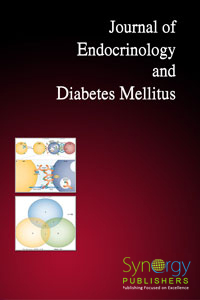
Choroidal Metastases from Oncocytic Thyroid Cancer (Pages 16-19)
Farida Chentli1, Assyla-Lylia Amirou1, Leila Ahmed-Ali1, Malika Terahi2, Nacima Djennane3, Rebiha Baba Ahmed 3 and Malika Tiar2
1Department of Endocrinology and Metabolic Diseases, Bab El Oued Teaching Hospital, 5, Boulevard Said Touati, Algiers, Algeria; 2Department of Ophthalmology, Bab El Oued Teaching Hospital, 5, Boulevard Said Touati, Algiers, Algeria; 3Deparment of Pathology, Bab El Oued Teaching Hospital, Algiers, Algeria, 5, Boulevard Said Touati, Algiers, Algeria
DOI: http://dx.doi.org/10.12970/2310-9971.2015.03.01.4
Abstract: Introduction: Choroidal and/or orbital metastases secondary to thyroid carcinoma are extremely uncommon and usually occur in late stage of the disease. The main symptoms are decreased vison and/or eye pain. However, they may be asymptomatic. They are diagnosed by clinical examination, ultrasounds, ocular computed tomography (OCT), and/or MRI. Radioactive iodine fixation is strongly suggestive of thyroid metastasis, but the certainty is given by histological study. When the last one is lacking, everyone agrees diagnosis of thyroid metastasis is nearly certain in the context of metastatic diffusion as in the following case:
Case Presentation: A woman aged 58, harboring an oncocytic thyroid carcinoma with numerous metastases (lung, liver, bones, and adrenals) which did not fix radioiodine, consulted for a progressive decrease in her vision. Ophthalmological examination revealed a painless palpable mass in the left orbital arch corresponding to an orbital metastasis and a reduced visual acuity of the right eye due to a choroidal tumor. B-scan ultrasonography, retinography, angiography and OCT were suggestive of bilateral choroidal metastases. As those did not fix radioiodine, the patient received six cures of tyrosine-kinase inhibitors with a poor response for all metastatic localizations.
Conclusion and Discussion: although very rare, choroidal metastases from thyroid carcinoma should be sought systematically, before the end stage of the disease, in order to prevent blindness and improve quality of life, especially when they are sensitive to radio iodine and/or to target therapy, which was not the case for our patient.
Keywords: Thyroid cancer, oncocytic carcinoma, choroidal metastases, orbital metastases. Read more

